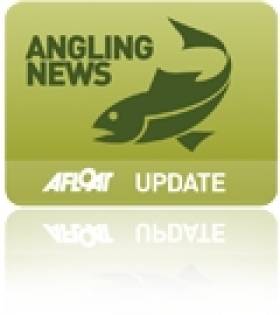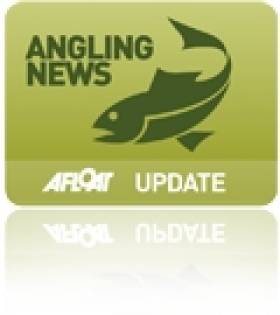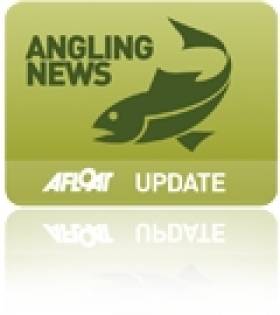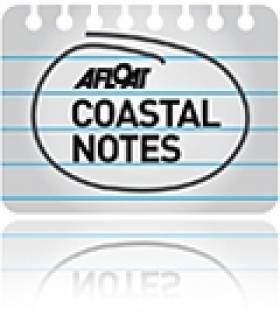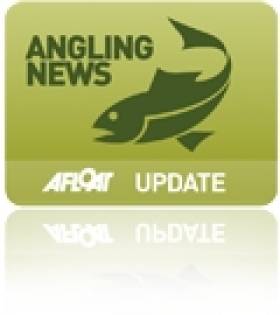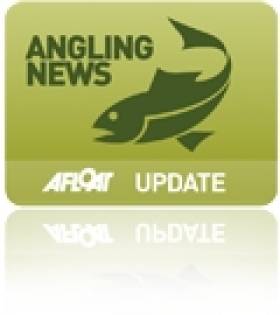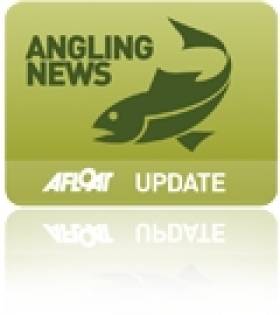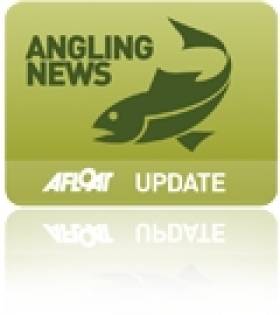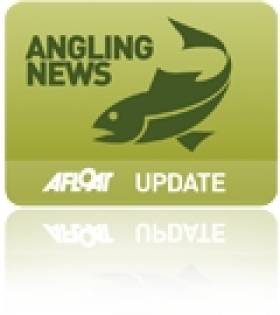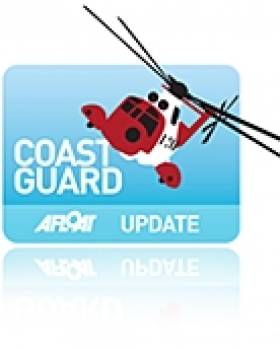Displaying items by tag: Fergus O'Dowd
#Angling - Minister Fergus O'Dowd launched Ireland’s first purpose-built disinfection station for angling enthusiasts at Ballyhoe Lake in Co Cavan on Wednesday 3 April.
The new facility - developed by Inland Fisheries Ireland (IFI) in co-operation with Interreg IVA (CIRB), the Irish Angling Development Alliance (IADA) and the local Meathhill Angling Club - will facilitate the disinfection of angling equipment on entry to the lake, helping to ensure that unwanted alien invasive species and harmful fish pathogens can be kept out of our natural fisheries.
Moreover, the development will also provide a template for further such facilities on fishery watercourses throughout the country.
The disinfection station is located at the entrance to Ballyhoe Lake, a prime Irish specimen tench fishery.
The entrance gate and the disinfection station are secured with combination locks, the numbers for which are available through nominated members of the Meathhill Angling Club (contact numbers for these members are provided on the tank). Members of the club will replace the disinfectant and manage the facility locally, as necessary.
Once opened, the tank contains a disinfection container for boots, keep nets, landing nets and stink bags. Disposable gloves are provided for angler use while disinfecting, and a brush is available to scrub boots, as well as a spray bottle for boats coming onto the lake.
Signage adjacent to and underneath the lid of the tank provides step-by-step instructions for the angler. Once the gear has been disinfected, the anglers apply a tag to his or her net to show that the process has been completed. Different colour tags will be utilised at the discretion of the operators.
Congratulating Meathhill Angling Club and the IADA at the launch, Minister O'Dowd said: "Angling clubs and federations the length and breadth of Ireland are key to the protection of our angling resources. By providing facilities such as this, we are adding to the goodwill and community commitment of Meathhill Angling Club to protect their fishery, while also ensuring access to it.
"This access helps to safeguard the sustainability of our valuable resource which will continue to bring much needed revenue to the local community through responsible angling activity."
The minister added that he "can’t emphasise enough the role anglers and clubs have on the frontline in the fight against invasive species, which supplements the great work in the area carried out by IFI with the support of representative bodies such as IADA."
Minister Launches 'World's First' Angling Kit To Combat Invasive Species
#Angling - The fight to stop the spread of invasive aquatic species in Ireland took to the frontline at the weekend with the launch by Minister Fergus O'Dowd of an Individual Angler Disinfection Kit – the first of its type in the world.
The kits are produced by Inland Fisheries Ireland (IFI) and funded by the CIRB (Controlling Invasives, Restoring Biodersity) INTERREG IVA Project, and were launched at the Ireland Angling Show 2013 on Sunday 17 February.
The kit is available in a durable and convenient kit bag and comprises 20 Virkon Aquatic (50g) tablets; a 500ml plastic trigger spray bottle; disposable gloves; a stiff bristle brush for cleaning boots, etc; a practical instruction manual; invasive species identification cards on a handy key ring; a metal ‘Stop the spread of invasive species’ badge; and an array of useful and relevant invasive species literature.
Now available from IFI, the kit will cover disinfection for up to 20 angling trips, and will help ensure that invasive species are not spread by unsuspecting anglers as they move from one watercourse to another.
In recent years, IFI says it has worked closely with anglers’ federations, clubs and other grouping to ensure that they are aware of the risks posed by aquatic invasive species and of actions that they can take to minimise the risk of introducing or spreading these aggressive and potentially harmful species. Invasive species include aquatic plants, animals (insects and fish) and microscopic pathogens.
The minister said: “Disinfection facilities have been developed by IFI to cater for large groups of anglers attending organised competitions and these have been well received. However, there are many anglers who do not fish competitions and who like to seek the solace of a quite water body where they can test their skills against the resident fish or simply watch a float as it bobbles in the water.
“We want to raise awareness among these anglers and help them in the same way as competition anglers to guard against the introduction or spread of invasive species or harmful pathogens."
Logistically it is impossible to provide disinfection facilities at every watercourse in the country to cater for all of Ireland's anglers, so a different approach was required. IFI says it recognised the long-standing responsibility taken on by anglers to protect and not adversely impact the aquatic habitat or water quality, so it is providing anglers with a portable kit to make disinfection more efficient and cost-effective.
At the show, Minister O'Dowd demonstrated the kit with the assistance of Dr Joe Caffrey of IFI to show how individual disinfection of angler’s equipment and clothing is relatively simple and can prevent highly damaging invasive species such as Asian clam and zebra mussel, and fish pathogens like the salmon fluke Gyrodactylus from being transferred into un-infested water bodies.
The minister commented: "As I meet more and more anglers around the country I am struck by your enthusiasm, knowledge, expertise and environmental responsibility. As a budding angler myself I look forward to using this kit and I know that you will embrace this initiative to ensure that fishing as we know it now can continue and improve under our watch, safe from the introduction of hazardous invasive pathogens, plants and animals."
Minister Praises Ireland's Angling Resource At Specimen Awards
#Angling - The Irish Specimen Fish Committee (ISFC) held its Specimen Fish Awards Day yesterday (Sunday 17 February) in Swords, Co Dublin coinciding with the Ireland Angling Show 2013.
Successful anglers from all over Ireland who caught specimen fish in lakes, rivers or in the sea in 2012 were congratulated by Minister of State for Natural Resources Fergus O’Dowd on their excellent achievements.
Last year was a record one for angling in Ireland, with a total of 640 specimen fish being ratified.
Minister O'Dowd said: “The Government recognises that angling is hugely important to the tourist industry and to the economy generally. Preliminary information from a survey commissioned by IFI estimates that angling tourism spend is €250m million per annum – approximately €150m of which is generated by domestic anglers.
"Angling opportunities in Ireland are among the best in the world and this is reflected in the demand for the product and the numbers engaged in it both at home and from abroad.
"The quality of our angling resource is reflected in the annual report of the Irish Specimen Fish Committee. The committee accepted over 640 claims in 2012 – a record. Irish anglers took over 90% of these fish with visitors from overseas taking the remainder.”
The minster also emphasised the importance of the half-century of information about large fish caught by anglers in Ireland, both freshwater and marine, which has been collected by the ISFC over the years.
This information is not only an important historical and heritage record but also a vital guide for anglers when choosing the best angling venues, dates, times and method to catch large specimens of their favourite species.
Anglers departed the awards event with their certificates and plenty of information to target new species in the new angling season in 2013.
The Specimen Fish Committee (ISFC) report 2013 can be downloaded from www.irish-trophy-fish.com. If you catch a big fish in 2013, log on to the website to see how to register your fish as a specimen.
Minister Welcomes Public Consultation on Fracking Research
#CoastalNotes - Minister for Natural Resources Fergus O’Dowd has welcomed the launch of a public consultation by the Environmental Protection Agency (EPA) on the proposed terms of reference for more detailed research to be carried out on the potential impacts of unconventional gas exploration and extraction on the environment, especially for inland and coastal fisheries.
Speaking last Friday, Minister O’Dowd said that he is particularly pleased that all interested parties, including individual members of the public, will have an opportunity to comment on the scope and objectives of this further research, thereby facilitating consideration of the broadest possible range of views.
Minister O’Dowd went on to say that “the detailed research to be commissioned by the EPA will build on other studies and research in this area and will inform future decision-making on any application that proposed the use of hydraulic fracturing in Ireland.”
Minister O’Dowd reiterated that until the EPA study has concluded and there has been time to consider its findings, the use of hydraulic fracturing in exploration drilling will not be authorised in Ireland.
Low Cost Licences To Encourage Angling Tourism Says Minister
#Angling - The Minister of State for Natural Resources has said the unchanged cost of fishing licences this year should encourage angling tourism in Ireland.
Commenting Thursday on his approval of the new regulations and by-laws for Ireland's wild salmon fishery which came into force on 1 January, Minister Fergus O'Dowd said: "Last year I lowered the cost of fishing licences and I have decided to maintain that price cut for 2013.
"I am anxious that lower costs will encourage sales of annual licences and incentivise angling tourists to avail of the Ireland’s first-class angling product."
Last week Afloat.ie reported that the Irish Times' angling correspondent Derek Evans welcomed the regulation changes for the start of this year's salmon season.
In an update to previously reported figures, conservation measures for this year involve the closure of 58 rivers due to a lack of surplus fish, down from 64 closures in 2012, while 62 rivers are open for fishing in what marks a significant rise on last year.
"This will provide opportunities for commercial fishermen and anglers to share this important resource on a sustainable basis," the minister commented.
Additionally, the Wild Salmon and Sea Trout Tagging Scheme regulations are "in essence unchanged" from last year.
Draft Net Season Won't Be Brought Forward Says Minister
#ANGLING - Minister for Natural Resources Fergus O’Dowd has confirmed that there is no proposal for the extension of the salmon draft netting season.
In response to concerns expressed by the angling community and highlighted by Derek Evans in The Irish Times last week, Minister O’Dowd emphasised that conservation and management of salmon and sea trout is key to protecting our valuable natural resources.
“Recent reports that the commercial season will be extended in certain rivers are untrue and I can confirm that for the 2012 season, the commercial fishing season remains as it was in all areas, with the River Suir still on a reduced season for snap fishing," said the minister.
"I am aware that confusion can arise due to the necessary extent of regulations in place. However, I am not considering any proposal for the extension of the commercial season."
The minister reminded that Inland Fisheries Ireland is the body that enforces Ireland's "extensive" fisheries legislation.
"IFI has offices throughout the country where advice can be sought. There is also a comprehensive and regularly updated website and information is also disseminated on Facebook and Twitter," he said.
Meanwhile, IFI chief executive Dr Ciaran Byrne said that the legislative code is regularly updated to ensure that Ireland's fisheries continue to be protected on the basis of information from IFI’s Standing Scientific Committee and IFI management advice.
“Only rivers with exploitable surpluses are open during the spring season and no fishery is open for commercial exploitation during this time," said Dr Byrne. "Fisheries that are classified catch-and-release or closed for salmon are now protected under bye-law 897 which prohibits the use of worms and the use of any fish hooks other than single barbless hooks.
"IFI’s priorities are maximising the return to Ireland, protecting sustainable jobs in isolated rural communities and promoting our wonderful angling resources," he added.
Survey to Assess Value of Irish Angling
#ANGLING - Inland Fisheries Ireland (IFI) has appointed Tourism Development International (TDI) to undertake a Socio-Economic Survey of Recreational Angling in Ireland.
The overall objective of the survey, which will run over the course of 2012, is to establish the current volume and value of domestic and overseas recreational angling in the country.
Pike, coarse fish, bass, salmon, sea trout, brown trout and sea anglers will all be invited to participate in what is described as Ireland's most comprehensive angling survey undertaken in decades.
The survey will inform IFI and its tourism partners in relation to the business of angling in Ireland and also enable improved strategic planning and decision-making in terms of product development and marketing.
"Anglers are the key to this survey," commented Minister of State for Natural Resources Fergus O'Dowd. "They know the resource and they understand the importance of sustainability. What anglers contribute to Ireland’s economy is unknown but I am certain that it is significant.
"Angling takes place in every river and lake in Ireland and all around our coastline. There is no town or village in Ireland that doesn’t have anglers."
He added: "It is imperative that the inland fisheries and sea angling resources are managed in the best way possible to ensure enjoyment for our local and visiting anglers, sustainable jobs in rural communities and maximising its potential to add to Ireland’s economy.
"Getting the right information from those most involved will greatly assist in improving the angling product."
The survey comprises two parts: a household survey and a survey of recreational anglers which will commence in April. Anglers will be met at fishing locations throughout Ireland and invited to participate there and then, or later by phone or online. IFI says that every effort will be made to accommodate participation.
- angling
- Inland Fisheries Ireland
- IFI
- Tourism Development International
- TDI
- survey
- SocioEconomic Survey of Recreational Angling in Ireland
- Pike
- Salmon
- Sea Trout
- brown trout
- coarse angling
- sea angling
- tourism
- business
- marketing
- development
- Minister of State for Natural Resources
- Fergus O'Dowd
- sustainability
- inland waterways
- jobs
#ANGLING - Plans to bring forward the estuary draft net season "would have a detrimental effect" on spring salmon stocks, writes Derek Evans in The Irish Times today.
Evans was responding to proposals before Minister of State for Natural Resources Fergus O'Dowd to extend the draft net season from its current start date of 12 May to mid-April.
"At a time when we are beginning to see the benefits of the 2006 drift net closure coming to fruition in terms of salmon returning to our lakes and rivers," he writes, "is it not absolutely unreasonable to even consider such an application?"
He referred to anglers who have "played their part" by sticking to a "suite of regulations" introduced by the State in an effort to conserve river stocks, which include a doubling of the salmon licence fee and an annual bag limit restricted to 10 fish.
Spring salmon angling is also a significant attraction for tourism, he suggests, and any threat could damage that business.
The minister's office has issued a statement saying there no proposal currently under consideration to bring forward the start date.
Anglers Win Support of IFI Board Over Shrimp Bait Ban
#ANGLING - Enniscorthy anglers have secured the support of the board of Inland Fisheries Ireland in their call to lift the ban on using shrimp as bait.
As the Enniscorthy Guardian reports, members of the Enniscorthy Local Anglers group argue that shrimp is ideal bait for catching salmon downstream, and are "baffled" by the ban on its use by IFI officials.
In a letter to the IFI they wrote: "'We see this ban as putting a direct stop to salmon fishing for 99% of our towns' salmon anglers as this is the only safe method of fishing that suits the stretch of river available to the people of Enniscorthy."
MInister of State Fergus O'Dowd is set to decide on the matter shortly, and anglers hope he will find in their favour in time for the opening of the River Slaney on St Patrick's Day.
The Enniscorthy Guardian has more on the story HERE.
New Helicopter for Irish Coast Guard is Completed
#COASTGUARD - Sikorsky has completed production of a new S-92 helicopter for the Irish Coast Guard under the rescue service's €500 million deal with CHC Ireland.
The US-based helicopter firm and CHC formalised the purchase on Wednesday (21 December) with Irish Coast Guard director Chris Reynolds during a hand-over ceremony at the S-92 commercial helicopter assembly facility in Coatesville, Pennsylvania.
Equipped for dedicated search and rescue (SAR) operations, the helicopter will provide coverage for deep Atlantic Ocean missions, service Ireland's offshore islands and provide rescue cover on the west coast from Cork to Galway.
The new aircraft will be based at Shannon and will replace the current coastguard SAR helicopter, a Sikorsky S-61, which has given 20 years of unbroken service.
According to Sikorsky, the S-92 is equipped with advanced systems and hardware, including an automated flight control system that enables the pilot to fly pre-programmed search patterns and perform delicate hover manoeuvres; a wireless intercom allowing a rescue swimmer to communicate with the crew; radio transceivers to communicate with ships and rescue services; a weather radar and infrared sensor; and a digital video system to record rescues.
Reynolds said the new helicopter - which joins four second-hand machines on a 10-year lease - represents a stepped improvement in Ireland's ability to care for and service its seagoing, coastal and island communities.
"I am very happy that the Coast Guard will operate what I consider to be the leading SAR helicopter in the world," he added.
As reported earlier this year on Afloat.ie, the new chopper is part of a deal that raised questions from a Fine Gael TD over allegations that a competing tender did not have a "good reputation".
Fergus O'Dowd questioning the contract with CHC Ireland after receiving documents in which Chris Reynolds said the Air Corps – whose helicopters are supplied by AgustaWestland - were uneqipped for the role and that no cost saving would be made if they took on the service.

